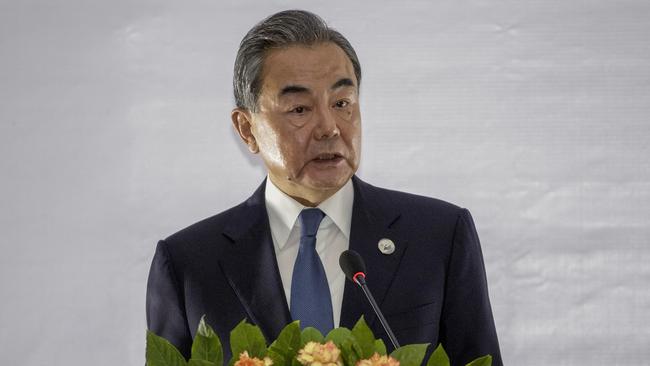Virus takes toll on China’s trade with ASEAN, Belt and Road Initiative
China’s Belt and Road Initiative and its critical trade with ASEAN nations will take short-term hits from the virus impact.

China’s Belt and Road Initiative as well as its critical $US641bn ($970bn) a year trade relationship with ASEAN nations will take short-term hits from the impact of the coronavirus, Beijing’s ASEAN envoy Deng Xijun said on Friday as the crippling epidemic nears its fourth month.
The admission follows a hastily convened meeting by Chinese Foreign Minister Wang Yi on Thursday with his counterparts from all 10 Association of Southeast Asian Nations member countries in Laos to seek an easing of trade and travel restrictions and discuss co-operation in public health measures.
China is ASEAN’s largest trading partner while the Southeast Asian bloc became China’s second largest trading partner last year when two-way trade reached $US641bn.
But Mr Deng said the impact of the coronavirus — which has brought the Asian superpower to a shuddering halt — would have a knock-on impact on a trade relationship critical to both sides.
“I agree there is negative impact to the economy, to economic co-operation between China and ASEAN countries. We know that China is the No 1 trading partner and is also the main source of tourists and investment for ASEAN … so for sure it will have a negative impact,” he said. Mr Deng said there were also “challenges to the trade and investment relations between China and relevant countries in the framework of the Belt and Road”, with some workers on infrastructure projects stuck in China and others unable to access supply chains.
“However, this is temporary and short-term,” he said. “We are very hopeful that with the decisive measures taken by the Chinese government the epidemic will be controlled and cleared up. We hope people-to-people, and normal trade and investment will be resumed as early as possible.”
The rare press conference by China’s ambassador to ASEAN in Jakarta appears part of a new outreach by Beijing, which has faced intense criticism over its initial response to the outbreak that has killed at least 2133 people and spread to 29 countries outside mainland China.
Mr Deng even repeated lines of a speech made by Foreign Minister Wang the day before when he told reporters at Friday’s briefing that ASEAN solidarity “made us feel that this winter is not that cold and spring is coming”.
Beijing has poured billions of dollars in infrastructure investment into Southeast Asian economies as part of its Belt and Road initiative, and in recent weeks has used veiled threats to try and temper measures taken by its smaller neighbours to prevent the spread of the disease. After Indonesia closed its air borders to mainland China earlier this month and flagged possible trade restrictions, Beijing warned that any further “exaggerated measures would result in consequences that neither party will want to see”.
Singapore, The Philippines, and Malaysia have also imposed strict travel bans on foreign nationals coming from China.
On Thursday, Mr Wang held a series of bilateral talks on the side of the special China-ASEAN meeting to press for an easing of those restrictions.
While both China and ASEAN committed to sharing information on the virus and “reducing the impact of the epidemic on the economic and social development of all affected countries”, the resumption of exchanges and co-operation would depend “on the progress of the prevention and control of the epidemic”, a later statement said.




To join the conversation, please log in. Don't have an account? Register
Join the conversation, you are commenting as Logout